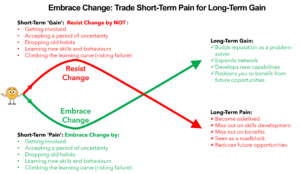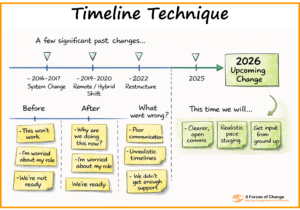
Is there a hidden payoff to implementing major organizational change, beyond achieving the benefits of the change itself? Is there such a thing as a ‘Change Dividend’?
Major organizational change is a challenging undertaking with many potential pitfalls that can leave you worse off than before you started. On the other hand, successful change delivers a number of hidden benefits that rarely get a mention.
Over many years of grappling with significant organizational change, I have witnessed a number of spin-off benefits, such as enhanced leadership, spotting hidden talent, increased employee engagement, surfacing of internal issues and developing organizational resilience; together, these constitute a ‘Change Dividend’.

https://en.wikipedia.org/wiki/Greta_Thunberg
“The role of a leader is to instigate change, period,” says John Kotter (the best-selling management guru). So, organisational change provides an ideal learning ground for developing leadership talent. With the right coaching and support managers have the chance to put key leadership principles into practice, such a spelling out a clear vision, involving their teams in shaping change, dialogue communication, and helping people break with the past and embrace the new. Putting managers front and centre in making change happen is a great way to develop their skills and to build their credibility as leaders.

Another opportunity is presented by ‘Change Champions’ – people from within the midst of your organisation who step forward to become part of the team that helps shape and implement change. I have seen many such people seize the chance to make their mark by playing an active role in change programmes. In this way, talented and enthusiastic people, many of whom may have been hidden in backstage roles, get the opportunity to shine. It is important that these people are nurtured and recognized, and that once the change has been embedded are given further opportunities to make a difference.

Employee Engagement is a key factor in successful change. Getting people involved in understanding the reason for change, then helping to shape and implement it at a local level is fundamental to promoting ownership and avoiding resistance to change. As managers work more collaboratively with their teams, they will see the benefits of engagement and carry the practice into everyday operations – involving front-line staff more in management tasks, such a problem-solving, leading to higher levels of contribution and motivation.
An apparent disadvantage of engaging employees in dialogue about change is that it creates a forum for people to air anxieties and grievances that go well beyond the challenges of change. Change often becomes a lightning rod for people’s gripes and moans, many of which may have a long history. But however painful this might feel at the time it has the benefit of bring issues out into the open, where they can be addressed, rather than leaving them to bubble below the surface, undermining morale. For instance, a new health and safety initiative may expose concerns about under-investment in infrastructure, providing leaders an opportunity to address the underlying concerns, enhancing faith in management and improving morale.

Finally, nothing succeeds like success. Success with one change enhances the credibility of managers and builds ‘change muscle’. This leads to enhanced motivation and performance and makes the next change a good deal easier to implement.
So, next time you invest in significant change, think about the long-term knock-on benefits of getting it right as well as the short-term gains.








